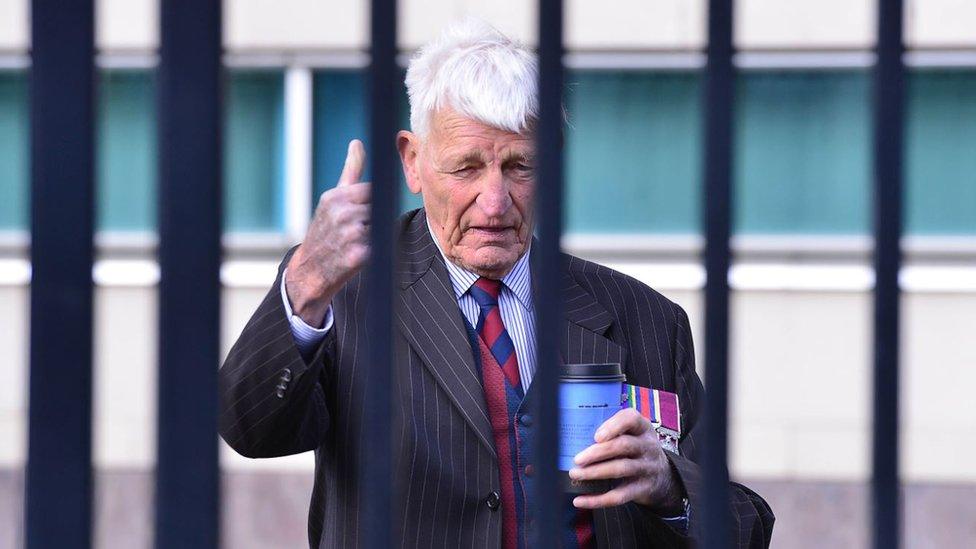Dennis Hutchings denies firing shots when John Patrick Cunningham killed
- Published

Dennis Hutchings pictured arriving at the crown court in Belfast on Monday
An Army veteran charged in relation to the fatal shooting of a man with learning difficulties does not accept he fired any shots, his trial has heard.
Dennis Hutchings, 80, denies attempting to murder and cause grievous bodily harm to John Patrick Cunningham.
Mr Cunningham, 27, was shot in the back as he ran from an Army patrol in a field near Benburb in 1974.
Mr Hutchings, from Cornwall, was a member of the Life Guards regiment.
A defence barrister told the second day of the non-jury trial at Belfast Crown Court that Mr Hutchings accepted he was in the field where the incident happened but "anything more than that is contested".
He added that the defence did not accept the identities of the two soldiers said to have fired five shots at Mr Cunningham - known as soldiers A and B - had been proved.
The court was also told that Mr Cunningham had been involved in a similar incident with an Army patrol in the same area a year earlier, when soldiers tried to detain him after finding him hiding in bushes "acting suspiciously".
The court heard he was released when a passing local doctor intervened and explained Mr Cunningham was his patient and he had learning difficulties and was innocent of any wrongdoing.
Earlier on Wednesday, the court heard from a man who lived near the scene of the shooting and who said he knew Mr Cunningham well.
In a statement read out by a prosecution lawyer the man, who was 17 in 1974, said on the day of the shooting he was at home when he heard someone shout: "Halt!"
John Pat Cunningham was 27 at the time of his death but had a mental age of between six and 10
He said that no more than 15 or 20 seconds later, he heard gun shots.
He said Mr Cunningham was afraid of three things: the priest, the police and the Army.
If he saw the Army, he would have "run through anything to get away," he said.
Statements from two soldiers who formed part of the patrol were also read out in court.
Soldier C and Soldier E said they saw a man who looked startled when they appeared and ran away.
While running, he had put his hand in his coat and then removed it.
Both men said they heard several shots being fired and both said warnings were shouted.
The Diplock-style, non-jury trial before Mr Justice O'Hara opened on Monday and is expected to last up to four weeks.
It will sit for three days each week to allow Mr Hutchings, who has been diagnosed as suffering from an incurable chronic kidney disease, to receive ongoing treatment.
The trial continues.